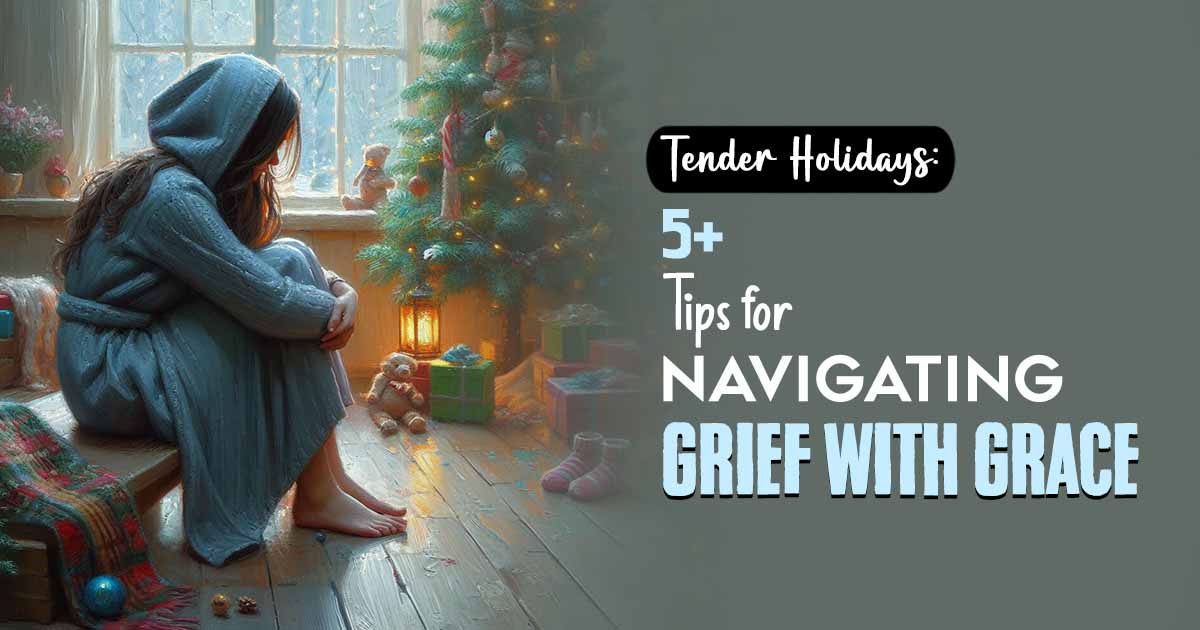The holiday season, usually connected with joy, warmth, and occasion celebrations, can turn into a challenging period for the bereaved. To successfully navigate the holidays with grief and address the loss of a loved one, one needs to find a balance between cherishing memories of the past and embracing new realities.
Understanding Grief During The Holidays
Grief is a profound and personal experience that cannot be timed or be expected to follow rules. During holidays when being together and having fun are cherished by society, the absence of a loved one becomes more heartbreaking. The vacant seat at the supper table, not unpacked gifts, and reminiscences of previous celebrations can make one feel sad and lonely or angry or even guilty.
For many people, Christmas only brings up memories of things they used to do together with lost loved ones, thus leading to feeling of loss. The issue here is how we can go through this festive time keeping in mind that people handle their sorrows differently. It should be noted that there is no single way for dealing with loss at such times, and it varies between individuals handling it.
Emotional Challenges of Grieving During the Holidays
Navigating the holidays with grief and addressing the loss bring about certain emotional challenges:
1. Intensified Emotions
The holiday season could heighten negative emotions woven around grief. Contrary to people celebrating life during this period, mourners often go into an intense phase of resignation from life due to death. The contrast between private sorrow and general merriment can result in emotional confusion.
2. Nostalgia And Remembrance
Traditions and rituals are greatly valued during holidays. For people who are grieving, such rituals will remind them of how good things were before and make them sad and nostalgic. Furthermore, when the deceased involves people they have previously spent holidays with and participated in rituals, it becomes hard for the bereaved to participate in the festivities.
3. Social Expectations
Society often expects grieving individuals to move past their loss and be merry and full of joy during the holiday. The bereaved may think that they are forced to smile and socialize, when actually they want to weep and address their grief in isolation. At times, the friends and family members of the bereaved put pressure on a bereaved person to attend holiday gatherings. In such instances, it is difficult to balance between grieving openly and participating in social functions, thus culminating in misunderstandings.
Practical Strategies In Order To Navigate The Holidays With Grief
Consider the following strategies in order to navigate the holidays with grief:
1. Acknowledge And Express Emotions
Recognizing your emotions during grief is vital for the healing process. Instead of bottling up feelings, mourners should let themselves grieve openly. This can mean writing in a personal journal, talking to a trusted friend or therapist about their grief, or joining a support group.
2. Modify Traditions Or Create New Ones
It may be necessary to change some traditions that are too painful and tough for you in their present forms. Adapt them so that they better suit your own emotional needs or start entirely new ones which are dedicated to the memory of your loved one. Have you ever thought about lighting a candle as a tribute or cooking his/her favorite meal?
3. Setting Boundaries And Talking About Them
Talk openly to friends and family about your needs during the holidays. Let them know if there are any activities or occasions that you would find hard to participate in for emotional reasons. Open honesty helps with managing expectations and creates a supportive environment.
4. Plan Ahead
Plan ahead for times when things might become difficult. Notice when you think intense emotions may start building up and have a plan on how to deal with those moments just in case they happen. It could mean taking breaks, leaving specific activities, or having someone close who can be there for you.
5. Honoring Your Loved One
Find ways to honor and remember your loved one during this holiday season. For example, you can decide to create memorial ornaments, dedicate a moment of silence, or engage yourself in a personally sentimental activity.
6. Self-Care And Compassion
Making sure that self-care is taken care of at Christmas time is essential. You should allow yourself alone time if need be; practice self-compassion as well. Grieving is a process and being kind to oneself is necessary for emotional well-being.
7. Seek Support
Don’t hesitate asking for help from friends, family members, or even professionals. Sharing feelings with others who understand your emotional pain can bring solace, as well as remove the feeling of isolation.
Navigating grief during the holiday period is a delicate balance between accepting loss and making room for what’s happening now that makes it quite challenging. The comprehension of emotional challenges connected with grief at this time forms the foundation for developing effective coping strategies.
By recognizing and expressing emotions, modifying or creating new traditions, setting boundaries, planning ahead, honoring the memory of the departed, prioritizing self-care, and seeking support, individuals can navigate grief during the holiday season with greater resilience and compassion for themselves. In doing so, they honor the complexity of grief and create space for healing during a time traditionally associated with joy and togetherness.


